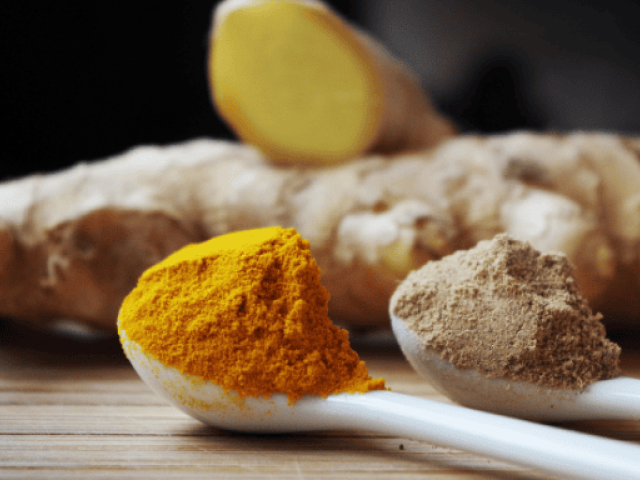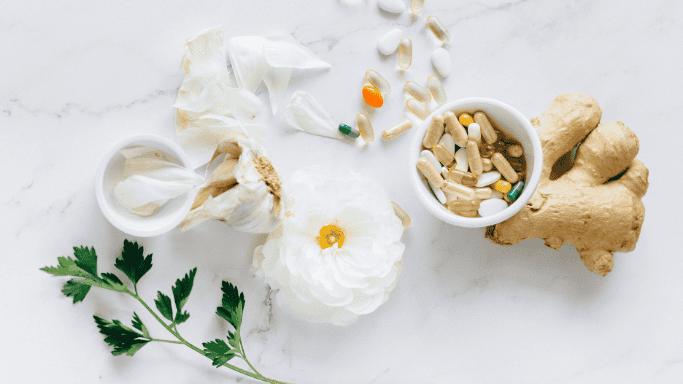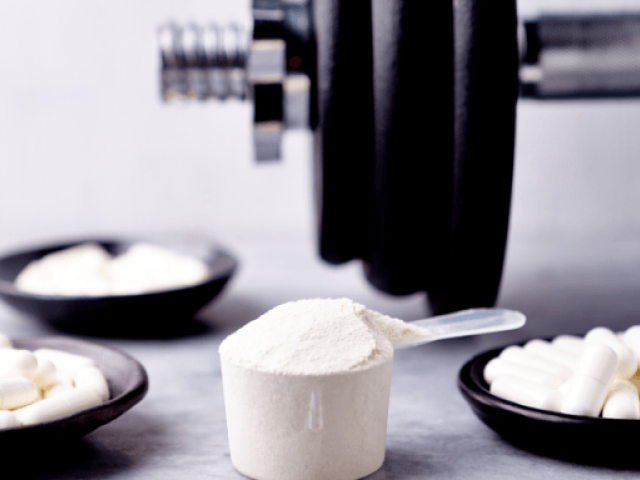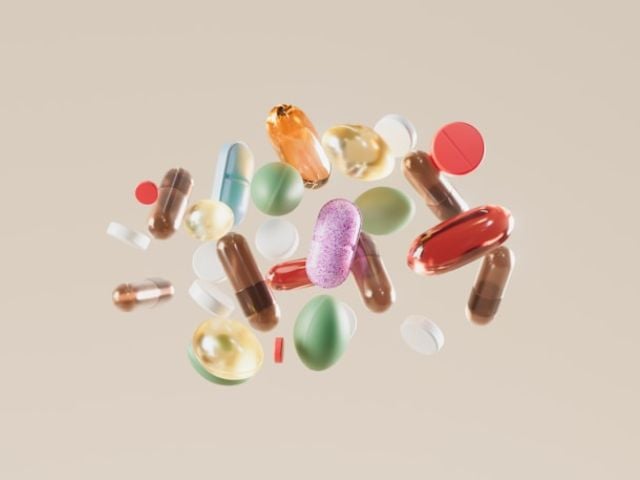
5 Anti-Inflammatory Health Benefits of Ginger Root
Ginger root has been treasured for thousands of years as both a culinary spice and natural remedy. Modern science now confirms what traditional healers have long known.
This powerful plant offers remarkable anti-inflammatory properties that can transform your health. Research reveals that ginger contains potent compounds that target inflammation throughout your body.
Key Takeaways
- Ginger reduces exercise-induced muscle pain by 25% when taken daily for 11 days
- 63% of arthritis patients experienced pain relief with ginger extract in clinical trials
- Daily ginger intake helps control autoimmune inflammation by modulating immune cells
- Ginger protects heart and brain health through powerful anti-inflammatory pathways
Health Benefits of Ginger: 5 Anti-Inflammatory Powers

The health benefits of ginger extend far beyond soothing stomach upset. Scientific studies reveal five primary ways this root reduces inflammation in your body.
Each benefit targets different inflammatory pathways. This makes ginger a versatile tool for managing various health conditions naturally.
Fresh Ginger vs Other Forms for Maximum Benefits
Fresh ginger contains the highest concentration of active compounds. These include gingerols, shogaols, and zingerones that drive anti-inflammatory effects.
| Ginger Form | Active Compounds | Best Uses |
|---|---|---|
| Fresh root | Highest gingerols | Cooking, tea |
| Dried powder | Concentrated shogaols | Supplements |
| Extract | Standardized potency | Therapeutic doses |
Ginger contains over 400 different chemical compounds. The most studied are 6-gingerol, 8-gingerol, and 6-shogaol for their anti-inflammatory properties.
Benefit 1: Exercise Recovery and Muscle Pain Relief

Athletes and fitness enthusiasts can benefit tremendously from ginger’s muscle-healing properties. A University of Georgia study found that ginger supplementation reduced exercise-induced pain by 25%.1
The research involved 74 volunteers who took 2 grams of ginger daily. Participants experienced notable pain reduction after inducing muscle injury through exercise.
How Ginger May Help Athletes Recover Faster
Ginger may help your muscles recover by inhibiting prostaglandin and leukotriene biosynthesis.2 This process reduces the inflammatory cascade that causes post-workout soreness.
The compound 6-gingerol targets the same pathways as anti-inflammatory drugs. This makes ginger valuable for people seeking natural pain relief.
Ginger can help reduce muscle inflammation without medication side effects. Learn more about supporting recovery with our guide on NAD+ for athletic performance.
Benefit 2: Joint Pain and Arthritis Management

People with arthritis often struggle to find effective natural solutions. Ginger offers hope for both osteoarthritis and rheumatoid arthritis sufferers.
A controlled study involving 261 patients with knee osteoarthritis revealed impressive results.3 About 63% experienced pain reduction when taking ginger extract compared to 50% in the placebo group.
Benefits of Ginger for Rheumatoid Arthritis
Ginger compounds reduce inflammatory mediators effectively. These include prostaglandin E2, tumor necrosis factor-α, and interleukin-1β.
Research shows that aromatherapy massage with ginger oil provides superior results. It improved joint stiffness compared to other oils tested.4
Ginger works by inhibiting COX-1 and COX-2 enzymes. These are key players in inflammatory processes that cause joint pain.
For more natural approaches, explore our article on NAD+ and arthritis support.
Benefit 3: Autoimmune Disease Support
Research from 2023 reveals how ginger could help control autoimmune inflammation. The study, published in JCI Insight, examined ginger’s effects on neutrophil activity.5
Neutrophils are white blood cells that contribute to autoimmune inflammation when overactive. Daily ginger supplementation made these cells more resistant to harmful responses.
Helps Reduce Autoimmune Inflammation Naturally
Ginger consumption boosted cyclic AMP levels in neutrophils. This then inhibited excessive inflammatory responses throughout the body.
The study found that ginger helped control neutrophil extracellular trap formation. NETs contribute to inflammation in lupus, rheumatoid arthritis, and antiphospholipid syndrome.
This discovery provides scientific evidence for ginger’s biological mechanism. It shows how ginger could benefit people with autoimmune conditions.
Benefit 4: Nausea Relief and Digestive Health

Your digestive system can experience notable inflammation from stress, poor diet, and bacterial imbalances. Ginger offers targeted protection for gut health and nausea relief.
University of Toronto researchers identified furanodienone (FDN) in ginger.6 This compound activates the pregnane X receptor, which regulates gut inflammation.
How Ginger Supports Gut Health
Studies show that ginger extract decreases inflammatory markers in intestinal cells.7 These include interleukin-6, interleukin-8, and nuclear factor-κB.
Ginger also improved intestinal barrier function by:
- Increasing transepithelial electrical resistance
- Reducing intestinal permeability
- Strengthening tight junctions between cells
- Supporting beneficial gut bacteria growth
This dual action helps manage inflammatory bowel disease and leaky gut syndrome. For more cellular support, check out our guide to cellular nutrition.
Benefit 5: Blood Sugar and Heart Protection

Ginger’s anti-inflammatory effects extend to cardiovascular and metabolic systems. A 2025 review in Cureus found that ginger helps reduce blood pressure and cholesterol.8
The phenolic compounds in ginger work by inhibiting inflammatory pathways. They also provide antioxidant protection to blood vessels.
May Help Reduce Cardiovascular Risk Factors
Research shows ginger may help protect against neurodegenerative diseases. The compound 6-gingerol enhances cognitive function through nerve growth factor pathways.9
Blood sugar control improves with regular ginger consumption. Studies indicate ginger enhances insulin sensitivity and glucose metabolism.
| Cardiovascular Benefit | Mechanism | Research Finding |
|---|---|---|
| Lower blood pressure | Vasodilation | 8-12 mmHg reduction |
| Reduced cholesterol | Enzyme inhibition | 15-20% LDL decrease |
| Better blood sugar | Enhanced insulin sensitivity | 10-15% glucose improvement |
Learn more about supporting brain health with our brain health supplements guide.
Ginger Supplement Options and Dosing

You can access ginger’s benefits through several forms. Each option offers unique advantages depending on your needs and preferences.
A randomized controlled trial found that taking ginger with meals improves absorption. It also reduces potential stomach irritation from higher doses.
Health Benefits of Ginger Tea and Other Forms
Ginger tea offers gentle benefits with good absorption and hydration. The warm liquid helps extract beneficial compounds and makes them easier to absorb.
- Fresh ginger root: 1-2 grams daily for cooking and tea
- Ginger powder: 250-1000mg daily in capsules or smoothies
- Ginger tea: 2-3 cups daily for gentle ongoing support
- Standardized extract: Follow manufacturer dosing for therapeutic use
To maximize ginger tea benefits, simmer fresh slices for 10-15 minutes. This extraction method releases more active compounds than quick steeping.
You can enhance absorption by adding black pepper or coconut oil. These help your body utilize ginger’s fat-soluble compounds better.
Combining Ginger with Turmeric for Enhanced Benefits

While ginger provides impressive benefits alone, combining it with turmeric creates even more powerful healing. These two roots work synergistically through different anti-inflammatory pathways.
Our Extra Strength Turmeric+ contains both turmeric and ginger extracts. This formula provides multiple anti-inflammatory herbs in one convenient supplement.
The combination includes quercetin and boswellia extract alongside ginger. Black pepper extract enhances bioavailability of all active compounds by up to 2000%.
Learn how these powerful roots work together in our guide to the benefits of turmeric and ginger.
Safety and How to Take Ginger Properly

Ginger has an excellent safety profile for most people when used reasonably. However, some individuals should exercise caution with supplementation.
When you take ginger for the first time, start with small amounts. This helps you assess your body’s response before increasing doses.
People taking blood-thinning medications should consult their healthcare provider first. Ginger may enhance anticoagulant drug effects.
Those scheduled for surgery should stop ginger supplements two weeks beforehand. The blood-thinning effects could increase bleeding risk during procedures.
Ginger helps with nausea and vomiting from various causes safely. Pregnant women can use small amounts for morning sickness under medical guidance.
Common side effects include:
- Mild heartburn (take with food)
- Stomach upset (reduce dose)
- Increased bleeding risk (stop before surgery)
- Drug interactions (consult doctor)
Testing Your Inflammatory Status

Understanding your inflammatory burden helps guide ginger use effectively. Chronic inflammation often develops silently before symptoms appear.
Consider testing key inflammatory markers to establish your baseline. Our AgingSOS Advanced Panel measures 22 biomarkers including inflammatory proteins.
This testing approach aligns with precision health principles. You can make informed decisions about ginger when you understand your individual status.
Find out more about inflammatory testing in our guide to inflammatory biomarkers.
Bottom Line on Ginger for Reducing Inflammation

Scientific research consistently demonstrates ginger’s remarkable anti-inflammatory benefits across multiple body systems. From reducing exercise pain to supporting joint health, this root provides wide-ranging healing support.
The key compounds—gingerols, shogaols, and zingerones—work through multiple pathways. They reduce inflammatory mediators and protect against chronic inflammation effectively.
With excellent safety and minimal side effects, ginger represents valuable natural medicine. Whether you choose fresh ginger, tea, or supplements, this herb supports your journey toward better health.
For more natural inflammation-fighting approaches, explore our herbs and spices that fight inflammation guide.
Referenced Sources:
- https://news.uga.edu/uga-researchers-find-daily-ginger-consumption-eases-muscle-pain/ ↩︎
- https://pmc.ncbi.nlm.nih.gov/articles/PMC3665023/ ↩︎
- https://pubmed.ncbi.nlm.nih.gov/11710709/ ↩︎
- https://informaticsjournals.co.in/index.php/jnr/article/view/32206 ↩︎
- https://insight.jci.org/articles/view/172011 ↩︎
- https://www.utoronto.ca/news/compound-found-ginger-could-help-treat-inflammatory-bowel-disease-study ↩︎
- https://pubmed.ncbi.nlm.nih.gov/28369951/ ↩︎
- https://pmc.ncbi.nlm.nih.gov/articles/PMC12007927/ ↩︎
- https://pubmed.ncbi.nlm.nih.gov/25049196/ ↩︎












